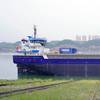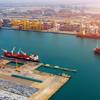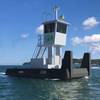DNV GL, Keppel to Promote Use of LNG as Ship Fuel
Norwegian classification bureau DNV GL and Singapore-based Keppel Marine and Deepwater Technology (KMDTech), a subsidiary of Keppel Offshore & Marine (Keppel O&M), have signed a framework agreement to boost the uptake of liquefied natural gas (LNG) as ship fuel.
The deal covers potential newbuilding projects including LNG bunker vessels, small-scale LNG carriers and floating storage regasification units (FSRUs), as well as LNG related assets employing battery and hybrid technologies.
“The signing of this agreement signifies another milestone in the close partnership between DNV GL as the leading classification society for LNG ships and offshore assets, and Keppel Offshore & Marine, a world leader in conversion projects for Floating Storage Regasification Units (FSRU) and floating liquefied natural gas vessels (FLNGV) as well as for newbuilding of small-scale LNG carriers and LNG bunker vessels,” said Cristina Saenz de Santa Maria, DNV GL’s Regional Manager for South East Asia, Pacific and India.
Abu Bakar Mohd Nor, Managing Director of Keppel O&M for Gas and Specialised Vessels, said: “We are pleased to partner with DNV GL in developing a suite of LNG related vessels that are ready to meet the needs of the market as the adoption of LNG as ship fuel increases. Working with DNV GL enables us to demonstrate the strength of our vessel designs and the viability of LNG for ship owners. We have a strong track record in delivering LNG solutions including the first FLNGV conversion as well as LNG fuelled vessels.”
The LNG carriers are each designed to carry up to 7,500 cubic meters of LNG in Type C-tanks. An optimised deck arrangement for the modular LNG gas supply, filling and safety systems increases the cargo capacity and efficiency of the vessels. They are equipped with engines that can run on both diesel and LNG, and will also have a class notation for bunkering which enables the provision of LNG bunkering services if required.
In light of the upcoming IMO 2020 SOx regulations, LNG as marine fuel is viewed as one of the most viable options for deep-sea shipping. DNV GL’s Maritime Forecast to 2050, part of the research behind the DNV GL Energy Transition Outlook 2018, projects that more than 10 per cent of the world’s shipping fleet will be powered by LNG by 2030, compared to less than 0.3 per cent in 2019. The report anticipates that LNG powered vessels will make up 23 per cent of the world’s fleet by 2050.












